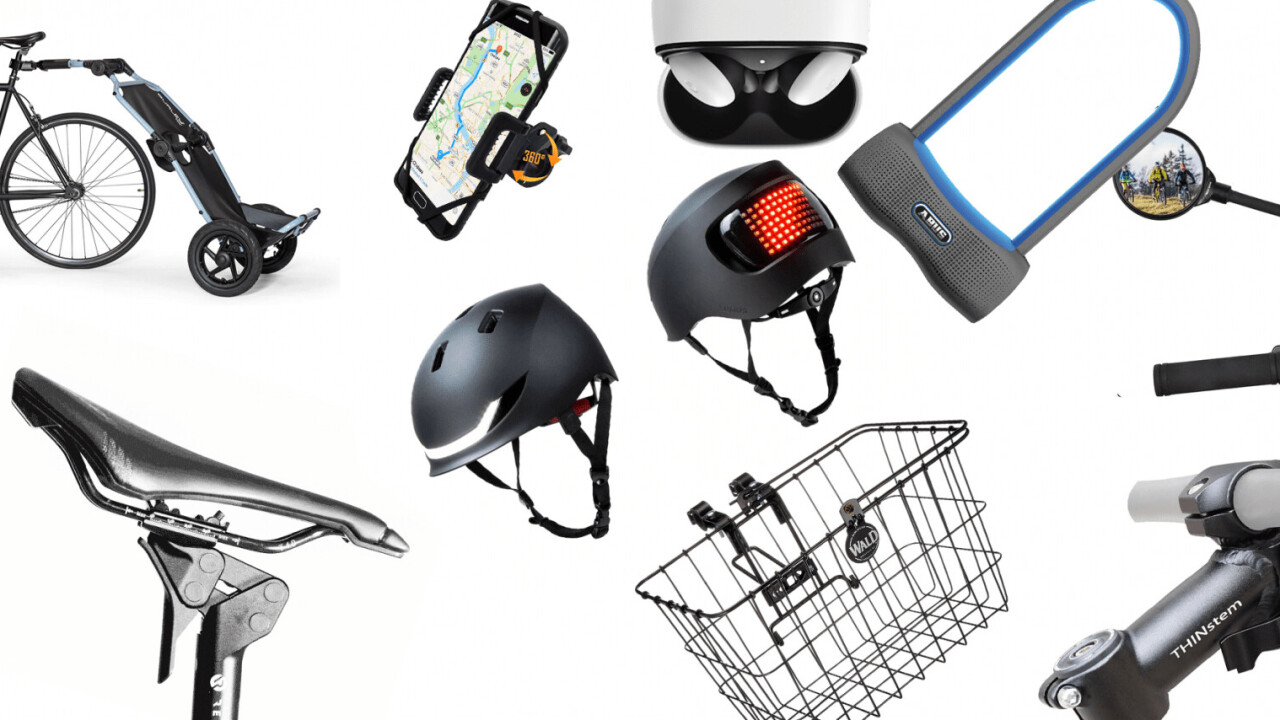
Last year, I decided I would start getting around New York City on an e-bike instead of dealing with crowded public transportation and expensive cabs. It’s one of the best choices I’ve ever made.
Most of that time has been spent riding a Juiced Bikes CrossCurrent X, although many were tested on a litany of other e-bikes as well. Over time, I’ve adopted several accessories to improve the riding experience, livability, and practicality of these bikes – many upgrades which I now can’t imagine living without. I’ve compiled a list of some of my favorite accessories below.
I intend for this to be a living list to be updated with new accessories over time. Keep in mind that though some of these products were sent for testing by their respective companies, everything on this list is a product I’ve actually tested extensively and genuinely enjoy using.
Though the products below were mostly tested on the CCX on New York City streets, and are intended for e-bike users who aren’t too concerned with weight or aerodynamics, they should work for any cyclist – some of them might even be useful for those on e-scooters too.
Lumos Matrix Helmet
Before I began getting around NYC on e-bikes, I was an occasional driver. And when I was driving, there were few things more annoying than cyclists who didn’t give turn signals.
Now as a cyclist, I’ve come to realize few drivers around these parts seem to even understand hand signals.

Thank goodness, then, for the Lumos Matrix helmet. A futuristic-looking noggin-protector with a cavalcade of customizable LED animations, the Matrix comes with a remote that straps onto your handlebars to activate turn signals. These are visible from both the front and the rear, unlike some alternatives, and the lights are bright enough to be seen in the daytime. The remote also contains an accelerometer, which is used to flash a warning light when you brake.
Most importantly, drivers seem to actually pay attention to me, giving me the right of way or waiting for me to make a turn in a way I never felt when simply using hand signals.. I even once got a comment from a driver thanking me for using turn signals.
Unfortunately, the Lumos Matrix is quite pricey at a street price of around $200 ($250 for the MIPS version). However, Lumos has a few less fancy, more affordable variants, and the company is currently working on a new $99 Lumos Ultra to begin shipping this fall as well.
Revelo Thinstem
The worst part about owning a bike in the city is how much space it takes. The ~$80 Revelo Thinstem fixes that with such a simple but clever idea that I can’t believe it’s not more common: it allows you to rotate the handlebars without turning the front wheel, turning your bike from an obstruction a couple of feet wide, to taking up just a few inches of horizontal space.
It means I no longer get stabbed by handlebars when rushing down my hallway, it means my bike is easier to bring in and out of my building, and it makes the bike easier to lock up in a crowded rack. Plus it takes about 5 minutes to install
I’m sure some of you are worried about the stem coming loose while riding, but there are a series of fail-safes in place to prevent that from happening Add a pair of folding or removable pedals (which Revelo also sells), and your bike goes from being an inconvenient obstruction to hardly taking any space at all.
Rearview mirrors
Here’s another accessory that I ‘borrowed’ from being a driver: rear-view mirrors. Of course, I can just look over my shoulder, but in a crowded traffic like NYC’s with unscrupulous pedestrians and cab drivers out of Mad Max, you can’t really afford to look away from what’s in front of you for very long. On an e-bike, where the added weight and drag are inconsequential, having rear-view mirrors feels like a no-brainer

I’ve used both these and these cheap rear view mirrors – each less than 30 bucks a pair – but anything that helps you look behind without taking your eyes off the road ahead will surely keep you safer.
Wald 133 Front Quick Release Basket
As far as I’m concerned, every bike should be a cargo bike. And though the Juiced CCX comes with a sturdy rear rack, sometimes I want to be able to keep an eye on my haul and not have to worry about bringing panniers or a bungee strap coming loose.
The Wald Quick Release front basket is an excellent solution for bikes that don’t come with front rack mounts. Wald is a reputable old name when it comes to bike accessories, and the sturdy lightweight basket can easily be removed to bring into the store for small shopping trips.

It can carry a large grocery bag or two worth of cargo, especially if you use a net or strap to keep items secure. And though you might have to get used to riding with the added weight on the front, the convenience and peace of mind of being able to see your haul is worth it. As a bonus, since the basket is easily removable, you don’t always have to bring it in
At less than $40 bucks, it’s a fairly inexpensive way to add a whole lot of utility.
Burley Travoy
Keeping with the cargo theme, sometimes you just need to carry large items or just do a massive grocery haul. Though quite pricey at $300, I’m convinced the Burley Travoy is the most practical cargo solution for most e-bike riders willing to pay.

Part bike trailer, part hand-truck, and part-granny cart, the Travoy attaches to your seatpost through a quick release hitch that makes the trailer easy to add and remove. I’ve carried everything from a couple of weeks worth of groceries to a Christmas tree to a drafting chair using the trailer; those last two aren’t something you’re likely to fit in a pannier.

The hitch itself only takes a couple of seconds to attach with no tools, making it a great option for people who regularly use bike-sharing services. And if your bike already comes with a rack, you can use an optional rack mount that’ll provide enough clearance for carrying panniers alongside the Travoy for those truly massive grocery lists. Oh, and it folds down to the size of a briefcase too.
Abus Bordo Alarm + Abus SmartX Bluetooth U-Lock
One of the biggest mental obstacles keeping me from becoming a cyclist in the city was fear of theft. While there’s no such thing as a truly theft-proof solution for locking up outside, I think I’ve found a winning balance of security and convenience with the one-two punch of the Abus Bordo Alarm folding lock and the Abus 770A SmartX Bluetooth U-lock.
Almost any lock can be bypassed by a determined thief, so your goal as a cyclist should be making your bike really inconvenient to steal. What makes this combination shine is the strength of the U-lock, the flexibility of the folding lock, and the sheer annoyance of having two loud motion-sensing alarms.
This combination allows me to secure the rear wheel and frame with the U-lock, while the less expensive front wheel and frame again are secured by the folding lock. Better yet, the folding lock is thin enough that it can slip between my saddle’s rails, making it easy to secure my expensive seatpost and saddle while being far more secure than a cable lock. And as this particular U-lock is all digital, you don’t have to worry about expert lockpickers either.
The cherry on top are the alarms. As both locks feature alarms (which are smart enough to tell the difference between an innocent bump and nefarious behavior), anyone wanting to so much as tamper with your bike will be met with an infuriating cacophony. Though the locks themselves only physically secure a few key components in my setup, the alarms mean I so far haven’t had any lights, pedals, phone mounts, or other accessories stolen despite leaving my e-bike out for hours on end – which is saying a lot for NY.
You don’t need these exact locks to get a similar level of flexibility and security, mind you. You could buy separate heavy-duty folding locks, U-Locks, and alarms, for instance.
Redshift ShockStop Suspension Seatpost
Most of us don’t have full-suspension mountain bikes, but with the way some city streets are maintained, we might as well. There are a variety of suspension seatposts on the market that can provide you with a cushier ride, but I’ve been using the ShockStop for a few weeks now, and it’s fantastic.
You can easily adjust the stiffness setting for your weight and comfort, and unlike most suspension seatposts, the ShockStop looks surprisingly sleek. 35mm of travel may not sound like much, but I find it’s just enough to provide a comfortable ride without totally eliminating that sense of connection with the road. Compared to my previous suspension seatpost, it seems to be more responsive to bumps on the road while providing a more natural, not-mushy feel while pedaling.
It’ll set you back $229, so this specific seatpost is not a cheap upgrade, but it’s certainly cheaper than buying a new bike. And if your bike has no front suspension either, Redshift also sells an excellent suspension stem.
TruActive Premium Phone Mount
There is no shortage of bike phone mounts, but I’m going to give a quick shoutout to the TruActive Premium Edition Phone Mount. I’ve gone through a few phone mounts that felt iffy on the road, but this one is both cheap and great.

For a little over 20 bucks, it comes with several extra straps to hold your phone in place should one of them fray or break. Even if it does, the mount’s rubberized adjustable grips should keep your phone in place. Plus, unlike some more expensive options, this one doesn’t require a special case, and it should fit just about any phone size.
Google Pixel Buds
While not a bike accessory per se, I’ve found Google’s new Pixel Buds to be, by far, the best headphones to use while on my bike.

Unlike the vast majority of headphones, the Pixel Buds can be completely controlled by saying ‘Hey Google’ or ‘Okay Google.’ This means I never need to let go of the handlebars, and the microphones are sensitive enough to work despite wind noise at high speed(which often doesn’t work with my phone’s own ‘Hey Google’ detection). The deep Assistant integration lets me control just about anything I need with just my voice, from navigation, to music, to responding to text messages.
(Note: There have been complaints about the Pixel Buds’ connectivity, but these issues mostly present themselves in stereo. On my bike, I only ever use one earbud).
The Pixel Buds’ ergonomic design helps them stay in my ears over long stretches; I’ve never felt like they were about to fall out. And as they let in a bit of ambient sound, they’re a good choice for making sure you can still hear traffic around you.
Apple users will likely find a good alternative in the AirPods Pro – I personally would not trust the cheaper AirPods to stay in my ears when I hit a pothole at 28mph, but your mileage may vary.
This post contains affiliate links to products you can buy online. If you purchase a product using one, TNW gets a small cut of the revenue.
Get the TNW newsletter
Get the most important tech news in your inbox each week.





